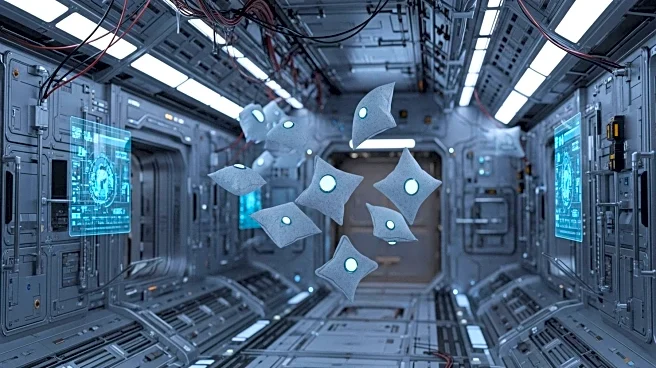What is the story about?
What's Happening?
NASA's Crew-11 astronauts have embarked on a new chapter in space agriculture aboard the International Space Station (ISS) with the VEG-03 experiments. These experiments involve planting seed pillows, which are thin strips containing seeds embedded in a clay-based growing medium, inside the Veggie chamber. The chamber uses LED lights to provide the necessary spectrum for plant growth. The astronauts have the option to grow various crops, including Wasabi mustard greens, Red Russian Kale, and Dragoon lettuce. This initiative aims to provide nutritional and psychological benefits to astronauts during their missions. The crew will monitor the plants, add water as needed, and document their growth through photographs. Some of the produce will be consumed fresh, while other samples will be frozen for analysis back on Earth.
Why It's Important?
The development of space agriculture is crucial for long-duration missions to the Moon and Mars, where fresh food will be essential for astronaut health and morale. By validating different crops, NASA aims to diversify astronaut diets and give them more control over their food sources. Additionally, the techniques developed for growing plants in space could have applications on Earth, potentially improving indoor crop cultivation and horticultural therapy programs. This could benefit individuals who are unable to engage in traditional gardening methods, such as the elderly or disabled.
What's Next?
NASA will continue to analyze the nutritional content and safety of the crops grown in space. The success of these experiments could lead to more advanced agricultural systems for future space missions, enhancing the sustainability of long-term human presence beyond Earth. The findings may also contribute to advancements in Earth-based agriculture, particularly in controlled environments.
Beyond the Headlines
The implications of space agriculture extend beyond immediate nutritional benefits. The research could lead to innovations in sustainable farming practices, both in space and on Earth. The psychological benefits of gardening in space could also play a role in improving mental health and morale during extended missions, highlighting the importance of holistic approaches to astronaut well-being.















